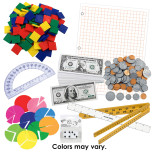We use cookies to make your experience better. To comply with the new e-Privacy directive, we need to ask for your consent to set the cookies. Learn more.
Before a child can grasp the abstract ideas needed for computational skills, the concrete foundation must be laid. These colorful rods, based on a 1 cm. unit, accurately portray the volume of a number. They encourage tactile manipulation of numbers and model-building, patterning and spatial discovery. Rods are flexible - they can be used to model almost any mathematical concept and develop a wide variety of skills.
Cuisenaire Rods sparked our childrens interest in arithmetic through lively investigation and visual and tangible confirmation of math concepts. I first read about the rods in the 1980s. I liked them so much that I used them with all three of my children when they were young and in their early elementary years. They all started out by learning the Cuisenaire poem by heart to identify the numerical value of each rod. The rods were very handy to teach concepts and beginning operations of mathematics. I found them particularly helpful with multiplication and fractions. Oh, we did our share of making sets with dried beans, forks, sea shells, and buttons, but it has been the use of the colorful Cuisenaire Rods that has come to my rescue most conveniently and logically to demonstrate what is on paper in black and white!
For custom cuisenaire rod kits for schools, homeschool groups, or cuisenaire rod class packages please contact customer service.



























